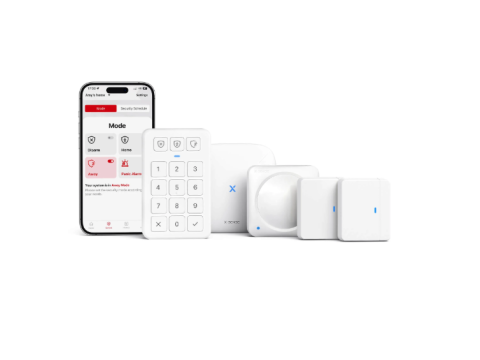Mobile Phone Security Systems: Two Approaches
Security systems using mobile phones can be implemented in two ways:
- DIY Security with a Mobile Phone: Modifying a phone to serve as part of the security setup.
- GSM Security Systems: Using mobile communication to manage and monitor a professional system.
While the second approach is reliable and practical, the first is often riddled with limitations and challenges.
DIY Security Systems Using a Mobile Phone
This method involves repurposing an old mobile phone to act as an alarm trigger, typically activated by a magnetic sensor on a door. The phone automatically calls a predefined number upon detecting unauthorized access.
Challenges with DIY Mobile Alarms
Power Supply Issues:
- Mobile phone batteries drain quickly, especially in older models.
- Constantly charging the device is unreliable and unsafe.
Limited Sensors:
- Basic setups often use only one magnetic sensor, providing minimal coverage.
- Adding multiple sensors increases complexity but doesn't improve reliability.
No Remote Management:
- DIY systems lack remote control options for arming/disarming or checking system status.
Low Reliability:
- DIY setups are prone to false alarms, malfunctions, and limited functionality.
Conclusion: DIY mobile alarms may seem cost-effective but fall short in practicality and reliability. For a robust system, consider professional GSM solutions.
GSM Security Systems with Mobile Alerts
A GSM security system is the superior choice for integrating mobile phone alerts. These systems are specifically designed for security applications, offering reliable notifications and remote management.
Key Features of GSM Security Systems
Instant Notifications:
- Alerts sent via SMS or calls to designated numbers in case of security breaches.
Remote Control:
- Arm/disarm the system, check status, or manage settings using SMS codes or mobile apps.
Compatibility with Apps and Cloud Services:
- Many systems, like "NORD" or "Sentinel," offer mobile apps or cloud-based dashboards for easy control and monitoring.
Expandability:
- GSM modules can integrate with various sensors (motion, magnetic, acoustic) to enhance security coverage.
Advanced Options:
- Mobile Internet Integration: For systems requiring real-time data exchange, ensure your GSM module supports GPRS or 4G connectivity.
- User-Friendly Apps: Look for solutions offering dedicated apps to simplify system management.
Why Choose Professional GSM Solutions?
Professional GSM security systems address all the drawbacks of DIY setups while providing the following benefits:
- Ease of Use: Plug-and-play installation and straightforward management.
- Enhanced Reliability: Built-in safeguards against power loss and signal interference.
- Scalability: Support for additional sensors and features as needed.
- Remote Access: Full control and monitoring via phone, app, or web portal.
Conclusion
For an effective and reliable security setup, avoid makeshift solutions and invest in professional GSM systems. These systems ensure seamless communication with your mobile phone, delivering peace of mind and enhanced security.
Explore high-quality GSM security systems at safsale.com and find the perfect solution for your home or business.

